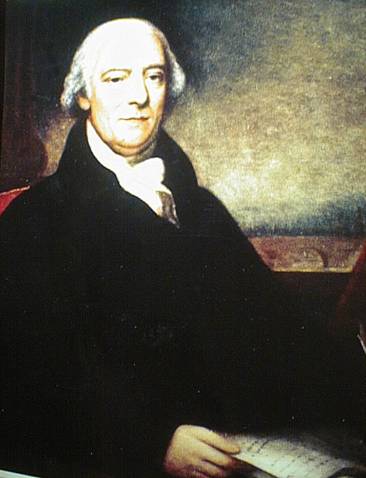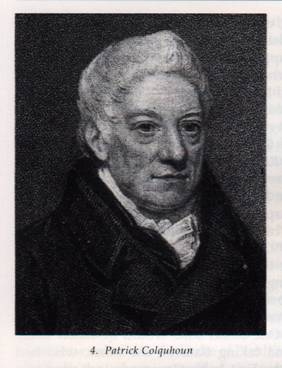May 2006
Next Month
we will be honored clan at the
Blairsville, GA festival. Our honored guest will be our Society
president, James H. Kilpatrick, Jr. FSA (Scot). Jim has had many
roles besides being our president both in and out of the American
Scottish community, and is a fascinating person to get to know if
you don’t already know him. We’re proud to be honored clan at this
new but expertly run festival that will be held the weekend of June
10th. Over the internet contact them at
http://www.blairsvillescottishfestival.org/
or
at:
Blairsville-Union
County Chamber of Commerce
P.O. Box 789
Blairsville, GA 30514
Phone: 706-745-5789 or (877) 745-5789
Thanks so much to Alastair Dinsmor chairman of the Glasgow Police
Heritage Society for donating this article about one of his favorite
people. His web site is here:
http://www.policemuseum.org.uk/
PATRICK COLQUHOUN – ‘THE FATHER OF
GLASGOW’’
 Patrick
Colquhoun was born on 14 March 1745 at Dumbarton and received his
early education at the grammar school there. His father, who was a
local judge and registrar of the records of
Dumbartonshire, died at the age of 44 years. He was related
to the Colquhouns of Luss.
Patrick
Colquhoun was born on 14 March 1745 at Dumbarton and received his
early education at the grammar school there. His father, who was a
local judge and registrar of the records of
Dumbartonshire, died at the age of 44 years. He was related
to the Colquhouns of Luss.
Before he was sixteen he proceeded to Virginia, where he engaged in
mercantile pursuits on his own account, and associating largely with
the legal profession. He continued with marked success on returning
to Scotland in 1766 with his health impaired and settled in Glasgow.
He became a Virginian merchant, a calling then at the height of its
prosperity.
On 22 July 1775,
he married Janet Colquhoun,
daughter of James Colquhoun (Provost of Dumbarton 1783-9). They had
three sons and four daughters.
In
1777, his firm of Colquhoun, Ritchie & Co. was situated at the back
of Mr. Colquhoun’s lodging on the north side of Argyle Street (next
to No.28).
In 1778, during the excitement caused by the war of the American
Revolution, he was one of the twelve principal contributors (£100)
to the local fund for raising the Glasgow Regiment, afterwards the
83rd Foot, to fight in America.
In
February 1781, he founded the Tontine Society, as premises for
merchants to meet for business, read newspapers and exchange, and on
2 October, that same year he was appointed
Baillie.
In
1782 he bought the lands of ‘Woodcroft’, (which he renamed
‘Kelvingrove’ in 1783)
and erected a mansion house. Property later became a municipal
museum and public park.
On 1 October 1782, he was
elected Provost
(Mayor) of Glasgow to fill the vacancy caused by the death of
Provost Hugh Wyllie and on 30 September 1783,
he was re-elected Provost.
In the latter year, he founded the Glasgow Chamber of
Commerce. This was the first Chamber of Commerce in Britain.
In 1786-9 he succeeded in procuring commercial laws beneficial to
the trade and commerce of Glasgow and to the British cotton
manufactures generally. He visited Manchester to obtain information
and then, in 1789, visited Belgium, promoting the merits of the
Lanarkshire and other British textile industries. His success earned
him the thanks of the Lanarkshire and Lancashire manufacturers; and
the title, since bestowed on him, of 'Father of Glasgow'.
In
1789, Colquhoun removed with his family to London. He was hoping
for a Government post in the West Indies, but this was not to be.
In
1792, when London’s judicial system was reformed, he was appointed
one of the new justices. Between 1793 and 1795, he investigated the
making and distributing of counterfeit coin in London drew up a list
of 130 individuals so engaged and many others who made a living
passing the coins. Exerted
himself to bring these people to justice and consulted
with the Government regarding the deficiencies in the laws which
lead to the passing of a new more effective law in 1796.
In
1794 he published a pamphlet suggesting that a charitable
organisation should be set up to buy back from pawnbrokers, the
work-tools of honest and industrious families, which they had been
compelled to pledge due to financial hardship. In 1796 he
established a society to carry out that objective, the result of
which, he suggested, would be to allow them to resume their trades
and avoid them falling into crime.
In 1795, when political discontent was aggravated by the high price
of food, he aided in establishing the soup kitchen in Spitallfields,
which was the first of its kind.
In the same year (1795) appeared the work by which Colquhoun is
chiefly known, his 'Treatise on
the Police of the Metropolis’, which highlighted the
disorganised state of policing in London.
He pointed out the
inefficiency of the old London watchmen, often chosen out of charity
for their poverty or advanced years. He suggested a proactive
police force which, although he did not admit it was other than his
own idea, was based largely on the police established in Glasgow,
Scotland, in 1789. As a magistrate, he had seen the effectiveness
of the Glasgow Police and incorporated the idea in his book. The
work attracted the attention of the Government, and even of the
King, going through seven editions, which were translated into ‘all
the languages of Europe’.
It was doubtless this work which stimulated the University of
Glasgow to confer the degree of LL.D on Colquhoun, in 1797. The
West India merchants applied to him in the same year to frame a plan
for the prevention of thefts from their property and ships lying in
the Thames. He undertook this with the encouragement of the
Government, for the consequent loss of custom duties rendered the
matter one of importance to the revenue. On 2 July 1798, Colquhoun
establishes the private Marine Police Establishment, London. This
later became the Thames River Police, by the Act of 27 July 1800.
Coincidentally, Glasgow Police achieved the honour of being the
first British municipal police force four weeks before with their
Glasgow Police Act of 30 June 1800 (29 years before Peel’s London
Police).
The benefits achieved by the West India planters by Colquhoun’s work
led the colonies of St.Vincent, Nevis, Dominica, and the Virgin
Islands to appoint him their agent in England.
In 1798 Colquhoun was appointed magistrate of the Queen Square
Office, Westminster, where he proceeded to procure the establishment
of a soup-kitchen for the poor.
In 1803 appeared his 'Treatise on the Functions and Duties of a
Constable,' and in 1804 the free town of Hamburg appointed him its
resident and consul-general in London, an example which was followed
by the other Hanseatic towns.
In 1806 he published 'A New and Appropriate System of Education for
the Labouring People,' explaining that in a school in Orchard
Street, Westminster, a sound and very cheap elementary education was
given to the children of the poor on Dr. Bell's system. In the same
year was issued his 'Treatise on Indigence', in which he recommended
the establishment of a Board of Education, of a National Savings
Bank with a state guarantee to the depositors. He also suggested the
issue of a police gazette, containing instructive reading, with the
statistics of crime and descriptions of the persons of offenders.

His last work of importance was his ' Treatise on the Population,
Wealth, Power, and Resources of the British Empire in every quarter
of the World,' (1814), of which a second edition appeared in 1815.
The most noticeable section of it is that
in which Colquhoun attempted to frame an estimate of the total
wealth of the British empire, and a
descriptive sketch of the British colonies and of the foreign
dependencies of the crown. In a concluding chapter Colquhoun
predicted, with the close of the Napoleonic Wars, the growth of a
surplus population, and pointed to the colonies as a promising
outlet for it with particular reference to South Africa.
In that year (1818) Colquhoun resigned his office of Police
Magistrate. He died in Westminster on 25 April 1830, aged 76 years,
leaving in his will £200 the interest of which was to be divided
among poor people of the name of Colquhoun in several specified
parishes of his native county, and not in receipt of parochial
relief. A memorial tablet was erected in St. Margaret’s Chapel,
Westminster.
Although Patrick Colquhoun is hailed as a police reformer in
England, there are no statues of him in Glasgow, where he is all but
forgotten. The Chamber of Commerce celebrate
his founding of their organisation by having the ‘Colquhoun Suite’
in their meeting rooms, on George Square.
The only other organisation to recognise him is the Glasgow Police
Heritage Society which has his story in their Glasgow Police Museum
in St. Andrew’s Square, Glasgow. Every day, groups of visitors are
told the story of the development of policing in Glasgow and how
Patrick Colquhoun carried the idea to London…….the rest, as they
say, is history.

